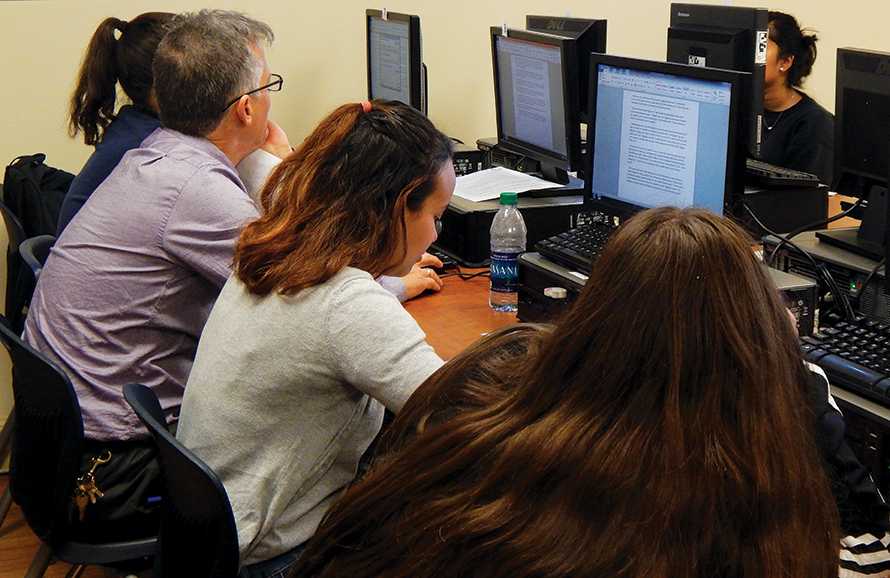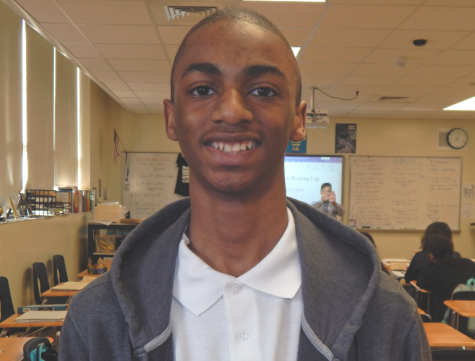Extra, Extra!
Photo by John Clement
Journalism students actively work on their news stories in class
What does it mean to be a journalist? The most obvious answer is to write for a newspaper, but there is much more to it beneath the surface. It is to work for something much bigger than you and to be part of a team, writing with a goal and a purpose. Most of all, as a writer of The Miami High TIMES, it is to represent our school, the place we Stings call home.
While it may not seem like it, writing for class and writing for the school newspaper are surprisingly different, and joining journalism this year made me realize that. At the start of the production for each issue, each student has to come up with an idea for a story to write. For the first four newspaper issues this year, I wrote about several different topics regarding the school, including the new wave of tablets for sophomores, MHS’ new art teacher Ms. Lee, testing season, and advanced classes, respectively. What you can write about isn’t just limited to topics like these, though; you can write about students, school events, and even opinions pieces on things like movies.
Once their story idea is approved, journalism students plan out questions they need answered, pick out their sources of information, and then start interviewing. After that comes the writing of the story itself, getting it checked by your editors, as well as laying it out on a page with a headline and a photo or graphic. Finally, there’s publication: the story being printed both online and in the actual newspaper.
Being introduced to journalism was a big learning experience. Aside from conventional English classes and half a year of Creative Writing, I was walking in to it blind. I hardly ever read the newspaper, and by no means had I ever written for one. Fortunately, I discovered that the class was very welcoming to beginners – or “rookies” – like me. For instance, during the first few weeks of the class, beginners got eased into it by going over the basics of journalism and the newspaper itself, including understanding what makes for a good story. At that time, “veterans” of the class would help the rookies getting their first interviews done and giving feedback on their first drafts.
I finish this year knowing much more than I did coming in. Many writing skills such as using quotes, organizing ideas, and getting readers’ attention became clearer to me. Ideas and facts alone don’t make an interesting story; creativity and originality are what makes something worth looking at. For instance, when I have to think of a headline for the article I’m writing, I don’t want to go with something plain such as “New Teacher Joins MHS.” Rather, I would title it something like “In With the New,” which is part of an idiom that many people recognize. I did exactly that in issue two, and it definitely made the story more attractive to readers. After all, the headline is among the first things readers look at in an article.
I also learned the difference between asking questions and asking the right questions. By doing this, you can ensure that you get good, detailed answers, which are the key part of creating a story worth reading. For instance, don’t just go up to someone and ask, “What is your favorite hobby?” Ask them follow up questions such as why they like it, when they do it, and what their favorite memory of it is. Doing this adds a lot of substance to the story that you wouldn’t have otherwise.
There are definitely both challenges and benefits when writing for the TIMES. Gathering the information needed for the story through interviews and research are some of the harder parts to me. When interviewing, I would often find that the person I needed to interview would be busy or not available. Also, being a bit shy at the beginning of the school year made having to introduce myself to and talk to so many new people uncomfortable for someone like me.
On the flip side, interviewing also happens to be one of my favorite parts of the class. By doing it, I get to meet so many interesting students and teachers that I wouldn’t have met before, and for those I already know, I sometimes get to learn some interesting facts about them. Finally seeing the story published feels greatly gratifying. Delivering the new issue throughout the school and hearing people say they have read, enjoyed, or learned a thing or two from the story you wrote are what makes it all worth while.
If you ever plan on taking journalism, there are definitely some things you have to be willing to do first. For one, being punctual is an essential skill. Admittedly, the deadlines for completing your stories and other work can be generous, but only if you don’t fall behind. Publication waits for no one; if you haven’t finished your story or gathered all the parts for it by certain dates, either you’ll have to turn your story in for little to no credit or your story may not even be published in the next issue.
You also need to be able to learn from your own mistakes. They will be made; there is no doubt about that. No matter how long you have been in the class, there is always room for improvement. Grammatical errors, factual errors, you name it – don’t expect to get anything perfect on your first try.
Still, as long as you recognize your mistakes and are willing to work towards improving them, you’ll be just fine. Don’t be intimidated, though – with a teacher like Dr. DeNight and student leaders dedicated to helping you, there won’t be anything to worry about.



